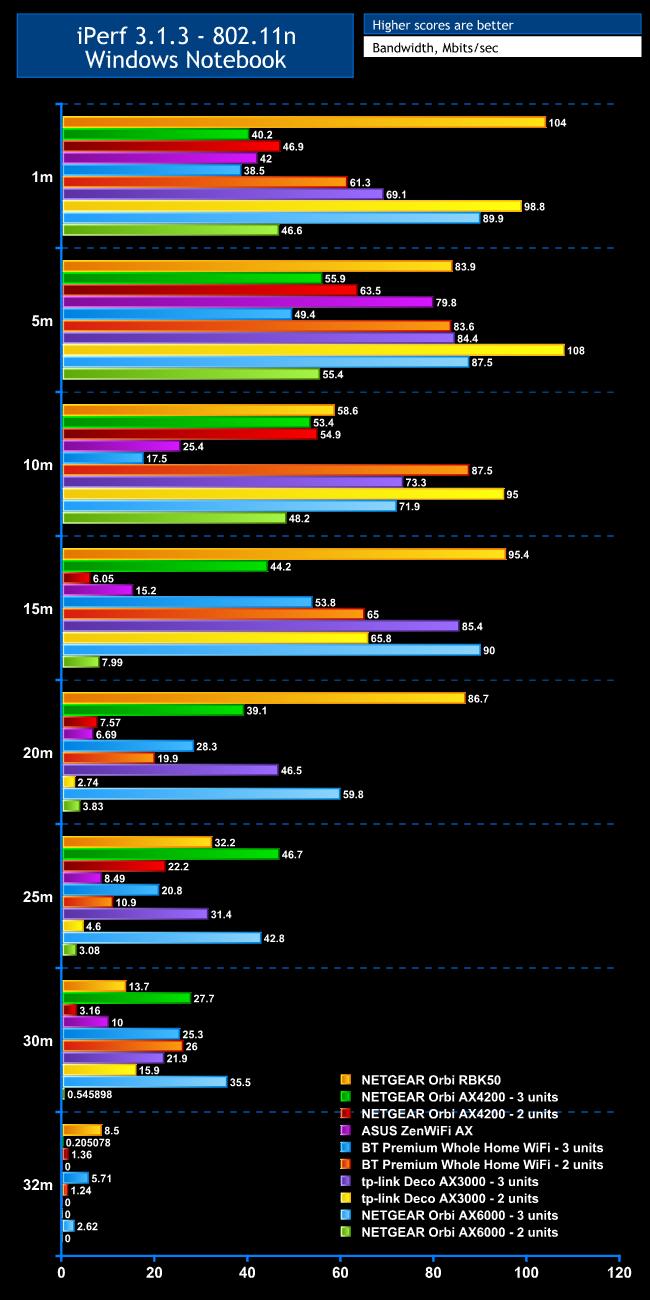802.11n Results
We always include 802.11n tests with an older notebook because quite a lot of people may still have a similar device and will want to know what kind of performance and range they can expect.
At 1m, the clear winner is the NETGEAR Orbi RBK50 with 104Mbits/sec, but tp-link with two units isn't far behind with 98.8Mbits/sec. In third place is the NETGEAR Orbi AX6000 with three units, delivering 89.9Mbits/sec, then tp-link with three units with 69.1Mbits/sec. NETGEAR's Orbi AX4200 also does better with two units than three – 46.9Mbits/sec versus 40.2Mbits/sec. ASUS's ZenWiFi AX sits in between the two at 42Mbits/sec. BT also does better with two units compared to three – 61.3Mbits/sec versus 38.5Mbits/sec. The NETGEAR Orbi AX6000 with two units manages a disappointing 46.6Mbits/sec.
Only some configurations drop off at 5m, with the two-unit tp-link actually going up to 108Mbits/sec, taking the lead from the NETGEAR Orbi RBK50, which only manages 83.9Mbits/sec. The NETGEAR Orbi AX6000 with three units manages 87.5Mbits/sec. The tp-link is still doing well with three units, managing 84.4Mbits/sec. ASUS actually improves at this range to 79.8Mbits/sec. NETGEAR's Orbi AX4200 is faster with two units than three – 63.5Mbits/sec versus 55.9Mbits/sec. The gap is even bigger for BT, producing 83.6Mbits/sec with three units versus 49.4Mbits/sec with two. NETGEAR's Orbi AX6000 is only providing 55.4Mbits/sec with two units.
At 10m tp-link remains ahead, hitting 95Mbits/sec with two units and 73.3Mbits/sec with three. BT is miraculously going up with distance, managing 87.5Mbits/sec with two units but strangely a much lower 17.5Mbits/sec with three. NETGEAR's Orbi AX4200 is going strong, producing 54.9Mbits/sec with three units and 53.4Mbits/sec with two. But the three-unit AX6000 is better, with 71.9Mbits/sec, although it only achieves 48.2Mbits/sec with two units. The ASUS ZenWiFi AX is already dropping off at this range, hitting 25.4Mbits/sec. NETGEAR's original Orbi RBK50 manages 58.6Mbits/sec.
At 15m range the original NETGEAR Orbi RBK50 is back in front, hitting 95.4Mbits/sec. Strangely, the Orbi AX6000 has leaped up to a close second with 90Mbits/sec using three units, although it can only manage 7.99Mbits/sec with two units. The tp-link is still doing well, too, although now it's the three-unit setup that is in front, with 85.4Mbits/sec, compared to 65Mbits/sec with three units. BT is still delivering faster performance with two units than three – 65Mbits/sec compared to 53.8Mbits/sec. NETGEAR's Orbi AX4200, however, is delivering much faster three-unit performance than with two units – 44.2Mbits/sec compared to just 6.05Mbits/sec. ASUS's ZenWiFi AX is still delivering a usable 15.2Mbits/sec.
The NETGEAR Orbi RBK50 remains well ahead at 20m, delivering 86.7Mbits/sec, while all others are dropping off much more. NETGEAR's Orbi AX6000 with three units is second at 59.8Mbit/sec, and the Orbi AX4200 is doing well with three units, delivering 39.1Mbits/sec, although the two-unit setup has fallen considerably to 7.57Mbits/sec, and the two-unit AX6000 has dropped to a miserable 3.83Mbits/sec. ASUS is now behind with 6.69Mbits/sec. BT's Premium Whole Home Wi-Fi is now providing better throughput with three compared to two units – 28.3Mbits/sec versus 19.9Mbits/sec. The tp-link three-unit combo is providing a very respectable 46.5Mbits/sec, but has fallen off a cliff with two units at 2.74Mbits/sec.
The 25m results have a few surprises, with the three-unit NETGEAR Orbi AX4200 taking over the top spot at 46.7Mbits/sec, but rallying with two units to 22.2Mbits/sec. The three-unit AX6000 is second with 42.8Mbits/sec, but just 3.08Mbits/sec with two units. The original Orbi RBK50 has dropped to 32.2Mbits/sec. ASUS's ZenWiFi AX is still hanging on at 8.49Mbits/sec. BT is respectable, delivering 20.8Mbits/sec with three units and 19.9Mbits/sec with two. Again, the differentiation between tp-link unit numbers is pronounced, with a great 31.4Mbits/sec for three units but a terrible 2.74Mbits/sec for two.
At 30m all the three-unit setups are still delivering usable speed. The NETGEAR Orbi AX6000 is in the lead with 35.5Mbits/sec, and the AX4200 second with 27.7Mbits/sec using three units, but a very marginal 3.16Mbits/sec using two. The two-unit AX6000 is unusable at 0.55Mbits/sec. ASUS is still providing 10Mbits/sec, which is commendable. BT is strangely now delivering slightly more performance with two units than three – 26Mbits/sec versus 25.3Mbits/sec. However, tp-link is providing the more expected faster with three than two, delivering 21.9Mbits/sec versus 15.9Mbits/sec.
Only three mesh setups remain worth considering at 32m, and the Orbi RBK50 returns to the top with 8.5Mbits/sec. BT with three units is managing 5.71Mbits/sec, and NETGEAR's Orbi AX6000 is delivering 2.62Mbits/sec. Although NETGEAR's Orbi AX4200 with two units is managing 1.36Mbits/sec and BT with two units 1.24Mbits/sec, this is on the edge of unusable and nothing else is worth considering.
Overall, the original NETGEAR Orbi RBK50 shows it's still great for 802.11n connectivity, and the Orbi AX6000 again underlines how it is worth the extra money if you want range. The revelation here is the three-unit BT Premium Whole Home Wi-Fi, which was still going strong at 32m. The three-unit NETGEAR Orbi AX4200 does very well out to 30m, and tp-link is more than acceptable, particularly with three units.
 KitGuru KitGuru.net – Tech News | Hardware News | Hardware Reviews | IOS | Mobile | Gaming | Graphics Cards
KitGuru KitGuru.net – Tech News | Hardware News | Hardware Reviews | IOS | Mobile | Gaming | Graphics Cards



